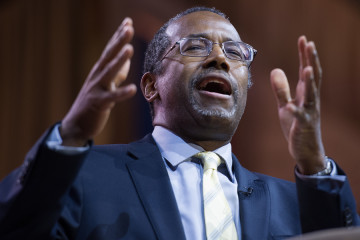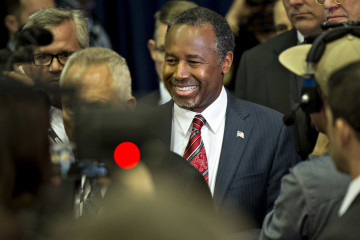What Carson’s Iowa Surge Doesn’t Mean: Jonathan Bernstein

©2015 Bloomberg View
NWOLRR6JTSEF
(Bloomberg View) — Donald Trump is no longer winning everywhere. The new Bloomberg Politics/Des Moines Register poll has Ben Carson on top in Iowa, with a 9-percentage-point lead over Trump. Combined with another national survey released yesterday, the HuffPollster estimate now has Carson at 26 percent to Trump’s 20 percent in the Hawkeye State.
Yes, it’s still very early. We’re a bit more than three months from the Feb. 1 Iowa caucuses, and it would be a lot more surprising if today’s polls match the eventual results than if there are still plenty more major swings to come.
Carson is, above all, a traditional Iowa social- conservative factional candidate. He follows in the footsteps of Pat Robertson (second place in the 1988 caucuses), Pat Buchanan (second in 1996), Gary Bauer (fourth in 2000), and current candidates Mike Huckabee and Rick Santorum, who won in Iowa in 2008 and 2012.
We don’t know whether Iowa social conservatives have really settled on Carson – again, it’s early, so his strong poll showing could be temporary. What does seem likely is that they’ll settle on a single candidate, and as long as the field remains relatively large that candidate will probably win, or at least come in a strong second.
None of these factional candidates has won the Republican nomination, but Huckabee (and to a lesser extent Santorum) – the two with conventional credentials for the presidency – sustained serious efforts in other states after winning Iowa. It would be fair to expect Carson, should he prevail, to have a lot less chance of building on an Iowa victory than Huckabee, Santorum, Ted Cruz or Bobby Jindal would.
That’s a good reminder that it’s far from clear how influential Iowa and New Hampshire actually are. Certainly, losers in those two states tend to drop out. But in many cases, the reason candidates do poorly in Iowa isn’t about voters there; it’s a consequence of failure in the invisible primary. Candidates who fail to win support from party actors – politicians, campaign and governing professionals, donors and activists, formal campaign staff and officials, party-aligned interest groups and the partisan press – have limited resources to compete in early states. That includes an often-decisive resource: Favorable publicity generated by party leaders.
Moreover, the results in Iowa are interpreted by those party actors (and, to a large extent, by the press) through what they know about the voters who are likely to attend caucuses. So if Carson wins, it will be discounted heavily because of Iowa’s history. Similarly, Jon Huntsman’s third-place finish in New Hampshire in 2012 was a campaign-ending defeat precisely because party actors know that a larger-than-usual percentage of New Hampshire Republicans are moderates or even liberals. If, say, Rick Perry had moved up to third in that primary (instead of actually finishing a poor sixth) he might well have been treated as a “winner.”
That’s not to say that Iowa and New Hampshire have no clout. (New Hampshire’s primaries, the nation’s first, come eight days after the Iowa caucuses.) Iowa social conservatives will be influenced by what happens in the invisible primary, but they still have the capacity to act independently as they choose among Carson, Huckabee, Santorum, Cruz and others. Other
Republican party actors may wait to see what happens in Iowa before choosing between Marco Rubio and Jeb Bush (who had his own splash of bad campaign news today), or possibly John Kasich or some other coalition-style candidate, looking particularly to whether any of them resonates with voters better than expected – given the resources they bring and the electorate they’re working with.
This column does not necessarily reflect the opinion of the editorial board or Bloomberg LP and its owners.
Thinking of Carson as an “outsider” just confuses things. He is inexperienced, like Trump and Carly Fiorina, but he’s a well- connected and established figure among social conservatives, who are a group firmly within the Republican Party. To contact the author of this story: Jonathan Bernstein at jbernstein62@bloomberg.net To contact the editor responsible for this story: Jonathan Landman at jlandman4@bloomberg.net
For more columns from Bloomberg View, visit http://www.bloomberg.com/view







No Comment